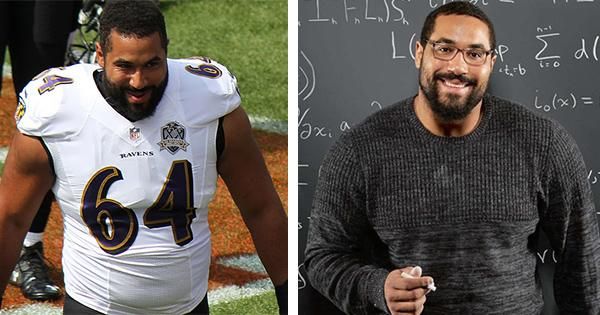John Urschel, former Baltimore Ravens player, has made an incredible career pivot from the NFL to academia, now serving as a math professor at MIT.

John Urschel’s journey from the football field to the academic world is a testament to the power of passion, intellect, and the pursuit of one’s true calling. Born on June 24, 1991, in Winnipeg, Manitoba, Canada, Urschel’s story is one of remarkable versatility and determination.
Urschel’s academic prowess was evident from a young age. He attended Canisius High School in Buffalo, New York, where he excelled both in the classroom and on the football field. His love for mathematics was nurtured during these formative years, setting the stage for his future endeavors.
He went on to study at Pennsylvania State University, where he earned both his bachelor’s and master’s degrees in mathematics. During his time at Penn State, Urschel was not just a standout student but also an active participant in teaching, leading courses in vector calculus, trigonometry, and econometrics. His academic excellence was recognized when he was named an Arthur Ashe Jr. Sports Scholar by Diverse: Issues in Higher Education in 2014.
In 2014, Urschel was drafted by the Baltimore Ravens in the fifth round of the NFL Draft. Standing 6’3″ and weighing 300 pounds, he played as an offensive guard for the Ravens. Over the course of his three-season NFL career, he appeared in 40 games, starting 13 of them. Despite the physical demands of professional football, Urschel continued to pursue his passion for mathematics.
In 2015, while still playing for the Ravens, Urschel co-authored a paper titled “A Cascadic Multigrid Algorithm for Computing the Fiedler Vector of Graph Laplacians,” published in the Journal of Computational Mathematics. This work highlighted his ability to balance the rigorous demands of football with his academic interests.
The turning point in Urschel’s career came in 2017, following a study by the Journal of the American Medical Association that found chronic traumatic encephalopathy (CTE) in 110 out of 111 deceased NFL players. The findings prompted Urschel to reconsider his future in football. Two days after reading the study, he announced his retirement from the NFL at the age of 26.
Urschel had already been accepted into the PhD program in mathematics at the Massachusetts Institute of Technology (MIT) and began his doctoral studies in January 2016. His research focused on spectral graph theory, numerical linear algebra, and machine learning. Despite the challenges of transitioning from professional sports to academia, Urschel thrived in the intellectually stimulating environment at MIT.
In 2021, he completed his PhD dissertation titled “Graphs, Principal Minors, and Eigenvalue Problems” under the supervision of Professor Michel Goemans. His work contributed to the field of mathematics, particularly in understanding the properties of graphs and their applications.
After completing his PhD, Urschel continued his academic journey as an assistant professor in the Department of Mathematics at MIT. He also served as a Junior Fellow at the Harvard Society of Fellows. In his teaching, Urschel emphasized the importance of a “quantitative mindset,” encouraging students to think critically and creatively rather than relying solely on memorization.
Beyond his teaching responsibilities, Urschel became a visible advocate for mathematics education. He visited local high schools to promote STEM education and worked to make mathematics more accessible and appealing to a broader audience. His efforts aimed to dispel the stigma surrounding math and inspire the next generation of thinkers.
Urschel’s commitment to public engagement extended to his writing. In 2019, he co-authored an autobiography titled Mind and Matter: A Life in Math and Football, which chronicled his unique journey from the football field to the classroom. The book offered insights into his experiences balancing two demanding careers and his passion for mathematics.
John Urschel’s story is a powerful reminder that one’s identity is not confined to a single profession or passion. His ability to excel in both football and mathematics challenges conventional notions of talent and success. By following his true calling in academia, Urschel has become a role model for individuals seeking to pursue their passions, regardless of societal expectations.
His journey also highlights the importance of considering long-term health and well-being in career decisions. Urschel’s proactive approach to his health and his decision to retire from football at a young age demonstrate a thoughtful and responsible approach to personal and professional life.
Today, as a professor at MIT, John Urschel continues to inspire students and colleagues alike with his dedication to mathematics and his commitment to making the field more inclusive and engaging. His story serves as a testament to the power of following one’s passion and the impact of interdisciplinary thinking.









